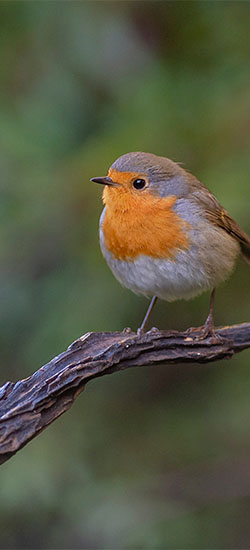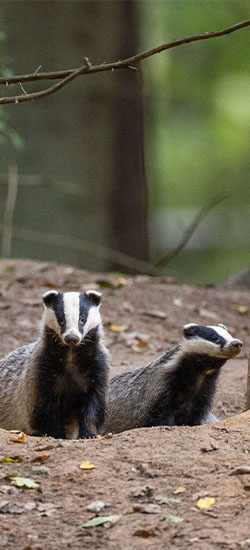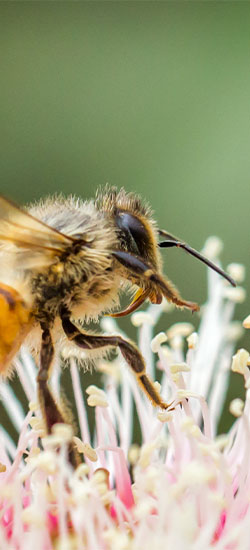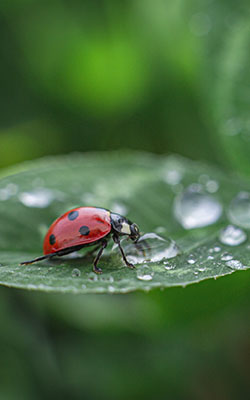February Wildlife Guide
Tips for helping wildlife in your garden this February
As the end of winter nears, we still experience some temperature drops before spring, so February is the perfect time to care for Wildlife you might find in your garden, whether you live in rural or urban setting!
Table of Contents

Wild Birds
In February our wild birds need a little extra care and it is important to note that winter migrating birds are still present in the UK. Here are a few tips to help encourage wildlife to thrive through to the end of winter:
• Put out fresh food for birds and other small animals such as nuts, berries, and seed mixes.
• Offer water sources like birdbaths or shallow dishes filled with fresh water. These should be kept clean and replenished regularly.
• Provide shelter from cold weather by placing nesting boxes in areas that are sheltered from strong winds and have plenty of natural shade and insulation. Ensure these are placed away from predators such as cats.
• If you live in an area with snow, ensure that the bird feeders are easily visible and placed away from areas where snow is likely to accumulate. This will make it easier for birds to find food when they need it most.
By following these simple tips, you can make a huge difference in helping wildlife survive the winter months. Wildlife is an integral part of our eco-system and we should do our utmost to ensure they are looked after. Together we can help create a future where both people and wildlife can thrive!
Mammals
In February, the UKs native mammals need plenty of food and shelter to survive through the cold weather. Here at Ruxley we think it is important to understand what these animals need and how best to assist and provide them with the essentials to survive and thrive throughout the winter. We recommend purchasing a Wildlife Guide to help you determine in depth the best way to care for these creatures you may often come across in your garden. Within depth information on creating shelters to meet their needs and food sources available for them.
For example, it’s essential that habitats be created in which mammals have enough space to move around, shelter and food storage options. A wildlife guide will guide you through creating habitats suited for small mammals such as voles and mice, and even larger ones – for those who live in rural areas – for badgers, foxes, hares and even deer. With Squirrels having their first litter of kits as early as February, mothers will need additional food until all of their kits have weaned then weeks later.
Finally, it’s important to be aware of the potential risks associated with caring for wildlife. Wildlife guides can help you understand how best to protect yourself from potential hazards like disease or predators. While Wildlife guides are great to keep you informed on the care and hazards, it is full of handy and useful information on laws and regulations that may affect your ability to care for wildlife in your area.


Bees
Helping your Bee population in February has grown in popularity over the years due to changing climates. With the weather fluctuating you may find that Bees are present before the first flowers have bloomed, leaving them in a fatal circumstance. To ensure that your bees are able to make it through the winter months, there are a few things that you can do.
First, if you have bee-friendly plants in your garden, allow them to stay standing during February! Many flowers and herbs will still be blooming in milder climates during this month, giving bees more options for food sources. Additionally, make sure you provide a source of water for bees in your garden. In February, the temperature is usually still too cold for natural sources of water like ponds and streams, so make sure that your bee-friendly plants have access to a shallow dish of water.
If you don’t have any bee-friendly plants in your garden, consider planting some! There are many flowers and herbs that will bloom in February and can provide much-needed sustenance for bees. Planting a variety of these plants will ensure that your bee population has enough food sources throughout the winter months.
With these tips, you can ensure any bees that happen upon your garden have the best chance of surviving during February and go on to pollenate throughout the summer! Did you know that a single bee colony can pollinate up to 20 million flowers a day?
Insects
While some insects may stay in hibernation for a little
longer or even migrating, others are still out ad about looking for food and shelter.
First, make sure to provide food sources such as dried
flowers, nuts and seeds. Insects will gravitate towards these food sources when
they search for something to eat. If you have a garden or outdoor space,
consider planting flowering plants that thrive in colder temperatures! These
can attract additional wildlife while providing valuable shelter and resources.
Second, provide water sources for insects by placing shallow
dishes of water around your yard. Keep them free from ice and snow so that the
insects can access clean drinking water during winter months. Add a few rocks
in the dish so that smaller creatures can drink safely without risk of
drowning.
Finally, create homes for local wildlife! Clean out old logs
and twigs in your yard, and provide them with a safe, dry place to hide. You
can also add birdhouses or insect houses to provide additional shelter.














